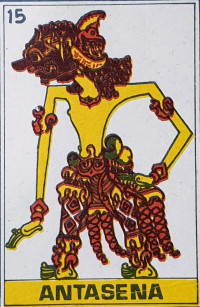Wayang Antasena
The Enigmatic Son of Earth and Sky.
Within the intricate narratives of Wayang Kulit, Antasena emerges as a complex and fascinating figure. Son of the mighty Bima (Werkudara) and the serpentine goddess Nagagini, his existence straddles the earthly and the divine. Antasena's character embodies loyalty, extraordinary power, and the complexities of navigating a dual heritage.

Birth and Transformation
Antasena's origins are shrouded in mysticism. The son of Bima, known for his immense physical strength, and Nagagini, a deity of the underworlds, Antasena embodies a blend of his dual parentage. Born with scales and unusual features, he undergoes a powerful transformation under the tutelage of the god Antaboga. Antaboga teaches him the secrets of the earth and grants him extraordinary gifts that mark him as a warrior of uncommon strength and ability.
Sacrifice and Devotion
A defining characteristic of Antasena is his unwavering loyalty to the Pandawas, his extended family. Despite facing hardships and challenges, he remains a steadfast protector. Even his extraordinary powers are often wielded in service of his cousins and their righteous cause. Antasena's tale culminates in an act of supreme sacrifice. During the Kurukshetra War, a prophecy reveals that one of the Pandava's sons must perish to guarantee ultimate victory. With unwavering devotion, Antasena willingly becomes this offering, ensuring the triumph of good over evil.
Symbolism in Wayang
Antasena's unique characteristics often lead to differing depictions within Wayang. Sometimes portrayed as somewhat rough or blunt, this reflects his straightforward nature and warrior spirit. Other times, he is shown as wise, symbolizing the balance between his brute strength and inner knowledge gifted by Antaboga. Key themes highlighted in Antasena's story include:
Hidden depths: Antasena's unusual appearance and origins speak to the idea that great power and virtue can emerge from unexpected places.
Self-sacrifice: His selfless demise highlights the importance of duty and service to a greater cause.
Duality: His origins and physical form suggest the constant balance of opposing forces – human and divine, mortal and immortal.
Last updated